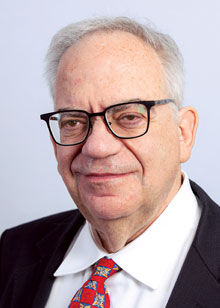Canada Honors APA Member for Groundbreaking Work
Abstract
Bruce G. Pollock, M.D., Ph.D., was among those appointed to the Order of Canada last December. He was honored for his pioneering contributions to geriatric psychopharmacology.
When Bruce G. Pollock, M.D., Ph.D., was a resident in Toronto at what is now the Centre for Addiction and Mental Health (CAMH), the psychoanalytic model of care was predominant. One of his patients at the time was a young woman who was not responding to desipramine. Even at the smallest doses, she complained that she was experiencing intense side effects. Pollock’s supervisor labeled the patient “hysterical,” but Pollock sent a sample of the patient’s blood to the United States for testing. It turned out that, even at the smallest doses, the patient’s blood had very high levels of the medication.

Bruce G. Pollock, M.D., Ph.D., devoted his career to improving the understanding of how psychiatric medications impact older adults.
This case, Pollock said, heavily influenced his research career, which he has devoted to clinical psychopharmacology. He has been internationally recognized for his work related to geriatric psychopharmacology in particular. Most recently, Pollock’s list of accolades has grown to include one of the highest civilian honors available to any Canadian. In December, Canada’s Governor General, Mary Simon, named Pollock a member of the Order of Canada. The honor recognizes individuals whose achievements and service have had an impact on communities both within Canada and beyond. Pollock was honored “for his pioneering contributions to geriatric psychopharmacology as a researcher, builder, and educator,” according to the Governor General’s website.
Past APA President Dilip Jeste, M.D., has known Pollock for over 25 years and is also a geriatric psychiatrist. “He is unquestionably a major international leader in geriatric psychiatry specifically, but also within psychiatry as a whole,” he said. “For governments to recognize the importance of psychiatry and mental health is critical, and to have his leadership recognized is great for our field.”
Pollock is now a senior scientist with the Adult Neurodevelopmental and Geriatric Psychiatry Division at CAMH. He previously served as director of CAMH’s Campbell Family Mental Health Research Institute and was the Peter & Shelagh Godsoe Endowed Chair in Late-Life Mental Health. He has received numerous prestigious awards during his career, including APA’s Jack Weinberg Memorial Award for Excellence in Geriatric Psychiatry, APA’s Mrazek Award in Psychiatric Pharmacogenetics, the Abrams Award in Geriatric Clinical Pharmacology from the American Society for Clinical Pharmacology and Therapeutics, and the Distinguished Investigator Award from the American Association for Geriatric Psychiatry (AAGP). He was also the first Canadian to serve as president of AAGP.
After completing residency, Pollock began applying clinical pharmacology to geriatric psychiatry while completing his Ph.D. at the University of Pittsburgh. “I would get frustrated because when I was looking at newer psychiatric medications, only lip service was paid to geriatric dosing and trials,” he told Psychiatric News. “No patients were included in the trials who were over the age of 65.” Those that did include people over age 65 included patients who Pollock described as “geriatric astronauts.” They had no other medical problems except the index psychiatric illness, while many patients in the general geriatric population have comorbid illnesses that may complicate how a drug affects them.
Early in his research career, as he and his colleagues were trying to optimize pharmacologic treatment, he said he became very interested in drug metabolism in the elderly. His work has shed important light on how drug clearance changes with age, which has influenced the ways in which older adults with psychiatric illnesses or dementia are treated in clinical practice. He has led numerous studies that have both resulted in new treatments for older adults and ensured the safety and efficacy of existing treatments.
His career has focused on treating depression in older adults, as well as treating the agitation that can accompany dementia. “I have long believed that the most common treatable illness in older people is caused, frankly, by us,” he said. “Medication has a significant impact on the elderly, both for good and ill.”
Jeste pointed out that ageism is a significant problem, but older people bring important strengths to society. “That is why research and clinical work that focus on how to help people live healthier and promote positive views of older people is critically needed,” he said. “That is what Bruce has been doing from the very beginning of his career.” ■



